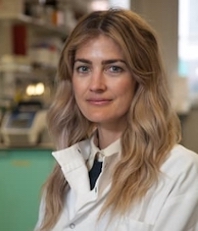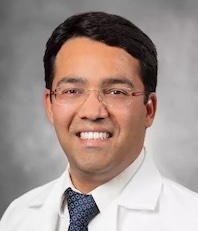Pilot Funds
2021–2022 Awardees
Digestive Diseases Innovative Awards (4 x $40,000):
The SDDRC has awarded pilot grants to promote innovative research in digestive diseases. This year's awardees are:
The SDDRC has awarded pilot grants to promote innovative research in digestive diseases. This year's awardees are:

Assistant Professor, Department of Medicine
About the Awardee: Dr. Curtius is an Assistant Professor of Medicine in the Division of Biomedical Informatics at UCSD and a member of UCSD Moores Cancer Center. Previous to this, she trained as a computational biology postdoctoral fellow in Barts Cancer Institute, UK, as well as a Gastroenterology postdoctoral fellow in the University of Washington (UW) Department of Medicine. She completed her PhD in Applied Mathematics at UW and has a BS in Mathematics from UCLA. Dr. Curtius’ interdisciplinary lab focuses on developing mathematical and statistical tools to better understand multi-scale data arising from the underlying process of somatic cancer evolution. Our current research goal is to combine multi-omics data along with clinical risk factor information in statistical models to create better translational cancer risk prediction tools for use in personalizing surveillance strategies.
Project Title: "Molecular biomarkers for colitis-associated colorectal cancer in patients with inflammatory bowel disease"
Summary: Patients with inflammatory bowel disease (IBD) have a 4-fold higher risk of developing colorectal cancer than the general population, and are thus recommended to undergo lifelong surveillance colonoscopies in order to catch cancers at an early stage. Our preliminary work demonstrated that molecular biomarkers improve predictive performance over clinico-pathological variables to risk stratify patients with IBD at high-risk versus low-risk of developing future cancer. However, the cellular and microenvironmental changes most important in steering evolution to cancer in IBD are incompletely understood. This proposal aims to define genomic and microbial differences that distinguish patients who progressed to colitis-associated CRC versus those patients who did not progress, and develop evolutionary models from whole genome sequencing of IBD tissue and liquid biopsies. Importantly, computational methods that are developed could then be applied in other gastrointestinal conditions that require high levels of surveillance.

Associate Professor, Department of Medicine UC San Diego
About the Awardee: Dr. Obonyo’s research focuses on Helicobacter pylori infection with the goal of Identifying novel unique pathways and genes for therapeutic intervention. She began her studies in Kenya and transferred to the University of Minnesota where she received a bachelor’s and master’s degrees in Animal Physiology and a PhD in Entomology studying the pathogenesis of Borrelia burgdorferi infection. Dr. Obonyo moved to UCSD for postdoctoral work on Helicobacter infection. Her research has been funded by NIDDK, NCI, and the Department of Defense (DoD). She pioneered a mouse model of Helicobacter infection with rapid disease progression compared to the standard gastric cancer mouse model. The model exhibits high activity/expression of pathways/genes that exhibit sub-threshold activation in the standard animal model of gastric cancer but are active in human gastric cancers. The use of this accelerated model will therefore allow for investigations of pathways that are active in gastric carcinogenesis but would otherwise not be amenable.
Project Title: "The role of type I interferons (IFN-I) in the pathogenesis of Helicobacter-induced disease"
Summary: Helicobacter pylori (H. pylori) is a bacterium that colonizes the human stomach in approximately half of the world’s population. It has been implicated in the pathogenesis of several digestive diseases, including gastritis, peptic ulcers, gastric cancer, and mucosa-associated lymphoid tissue (MALT) lymphoma. As an example, peptic ulcers and gastric cancer together account for over a million of global deaths annually. Studies using our animal model for gastric cancer indicate that a pathway called type I interferons, which is usually linked to fighting viruses, is highly activated. This indicates that this pathway may be responsible for the severe disease outcome we observed in our animal model, and reveals a previously unidentified role of this pathway in Helicobacter-related diseases. In this project we will study how this pathway is involved in causing disease during infection with H. pylori. The main goal of the project is to identify new targets for therapeutic intervention.

Assistant Professor, Department of Medicine UC San Diego
About the Awardee: Dr. Singh is an Associate Professor of Medicine in the Division of Gastroenterology, with an adjunct appointment in the Division of Biomedical Informatics at UCSD. He is also the Director of the IBD Center at UCSD. Dr. Singh has completed a National Library of Medicine-funded fellowship in Clinical Informatics at UCSD and has previously received a Master’s Degree in Clinical and Translational Science from the Mayo Clinic. His research interests are two-fold: (a) population health management and value-based care in IBD, including comparative effectiveness research, health disparities research, and (b) identifying modifiable predictors of disease course and response to therapy in IBD, including the role of obesity.
Project Title: "Mesenteric Fat-based Imaging Biomarkers for Crohn’s Disease"
Summary: Patients with Crohn's disease have a unique form of abdominal fat, called creeping mesenteric fat, which wraps around the intestine and plays a part in causing the disease. However, it has been difficult to study this fat which can only be accessed via surgery. With advancements in magnetic resonance imaging technologies, we propose to study this unique fat compartment in patients with Crohn's disease. We seek to identify novel imaging-based biomarkers that can help identify patients with Crohn's disease who are at high risk of disease complications and treatment failure.

Professor, Department of Medicine
About the Awardee: Academically, Dr. Webster was an undergraduate at Cambridge University where he held a Wilson Scholarship in Natural Sciences. His Ph.D. dissertation work was performed at Stanford University under Professor Michael Pirrung and focused on the mechanism of photochemical cycloadditions. Dr. Webster was then awarded a Royal Society Fellowship for post-doctoral studies with Professor Pierre Chambon at the CNRS in Strasburg, France. During these studies, he demonstrated that yeast transcriptional activators could function in mammalian cells and that heterologous DNA binding domains could be used to target chimeric mammalian transcription factors to cognate response elements. Dr. Webster joined the Division of Endocrinology and Metabolism at UCSD in 1989. His major research interests lie at the intersection of metabolism and cancer. One of his current projects is to analyze the role of circadian synchronization by time-restricted eating in preventing obesity-induced breast cancer growth. He has shown that restricting food consumption to just 8 hours per day lowers insulin levels and inhibits breast cancer growth in pre-clinical mouse models. His lab is also interested in how metabolic derangements in hepatocytes in the liver causes hepatocellular carcinoma. They found that disruption of RNA alternative splicing by deletion of a splicing factor impairs splicing of selected RNA isoforms resulting in a liver regeneration phenotype, with increased hepatocyte cell death and compensatory proliferation. This leads to inflammation and fibrosis, and the accumulation of somatic mutations, eventually leading to hepatocellular carcinoma. They have also shown that livers of people with non-alcoholic fatty liver disease (NAFLD) and non-alcoholic steatohepatitis (NASH) already show such alterations in RNA splicing, suggesting this is an early event in progressive liver disease.
Project Title: "Ketone supplementation for tumor prevention in HCC"
Summary: Hepatocellular carcinoma is the most common form of liver cancer. It is the 2nd leading cause of death from cancer worldwide. According to recent statistics from the CDC, liver cancer is the only cancer for which both the incidence and mortality are rising. The American Cancer Society predicts that there will be 42,230 new cases of liver cancer in 2021 and 30,230 deaths, which underscores the poor survival rate from these cancers with a 5-year survival rate of only 19%. Ketogenic diets are receiving a lot of interest currently as a potential lifestyle modification that can be beneficial in the short-term in both preventing cancer and during therapy. Unfortunately, consumption of a ketogenic diet in the long term is harmful and causes fatty liver and other problems. It is assumed that the elevated ketones caused by the ketogenic diet are the active component, but it has been difficult to dissociate the effects of the ketones from the effects of the high-protein, high-fat, low carb diet. We have been working with a company who have developed an orally available form of ketones. So, we can now test whether simply elevating ketones has a beneficial effect on liver cancer. If so, ketone supplementation may avoid the long term negative effects of the ketogenic diet.
The Isenberg Endowed Fellowship was jointly awarded by the Pilot/Feasibility Program of the San Diego Digestive Diseases Research Center and the Hellman Family Foundation. The fellowship, given in honor of the late Dr. Jon Isenberg 1979-1993 to promote Dr. Isenberg's lifelong research interests including intestinal epithelial ion transport mechanisms, mucosal defense, peptic ulcer disease, and cystic fibrosis, as applied to the intestine, liver, and biliary system.

Associate Professor, Department of Medicine UC San Diego
About the Awardee: Shailja Shah, MD MPH is a gastroenterologist and clinical investigator. She is an Associate Professor of Medicine at the University of California San Diego, a staff gastroenterologist at the VA San Diego, and is a member of the Cancer Control Program at UCSD Moores Cancer Center. Dr. Shah serves as VA San Diego’s co-Local Site Investigator for the Million Veteran Program (MVP), a nationwide prospective EHR-linked genomic biobank, and is also co-Director of the UCSD GEODE Translational Research Program. She completed her Internal Medicine residency at the University of California, San Francisco (UCSF), completed a Gastroenterology fellowship at Icahn School of Medicine at Mount Sinai in New York City, and then joined the faculty in the Division of Gastroenterology at Vanderbilt University Medical Center until 2021. Dr. Shah’s research is focused on Helicobacter pylori and inflammation-associated GI carcinogenesis, as well as the implementation of gastric cancer prevention and early detection programs in the United States.
Project Title: "Defining genomic alterations operational in the critical transformation from gastric intestinal metaplasia to neoplasia"
Summary: Gastric cancer (GC) is the 3rd leading cause of cancer-related death and the 5th most common cancer in the world. Routine screening for GC and surveillance of gastric precancer (e.g. gastric intestinal metaplasia, GIM) is not routinely recommended in the United States due to insufficient evidence. This contributes, in part, to the late stage at which most GCs are diagnosed in the US and the overall poor prognosis. Although there are clinical and histologic factors associated with the risk of neoplastic progression in patients with GIM, these factors are insufficient to discriminate patients at the highest vs lowest of progression. In this proposal, Dr. Shah aims to identify molecular alterations that are associated with high vs low-risk GIM.